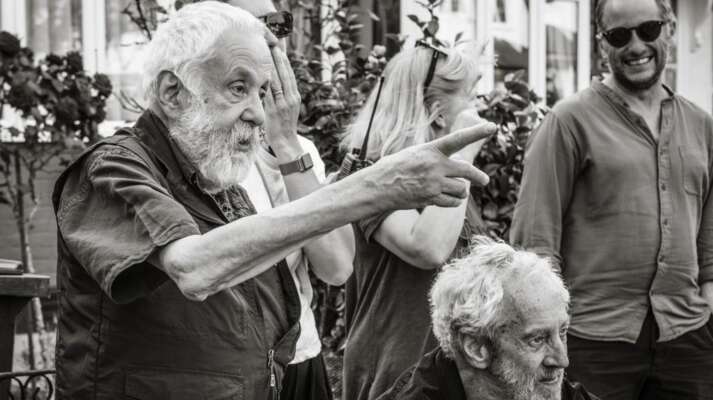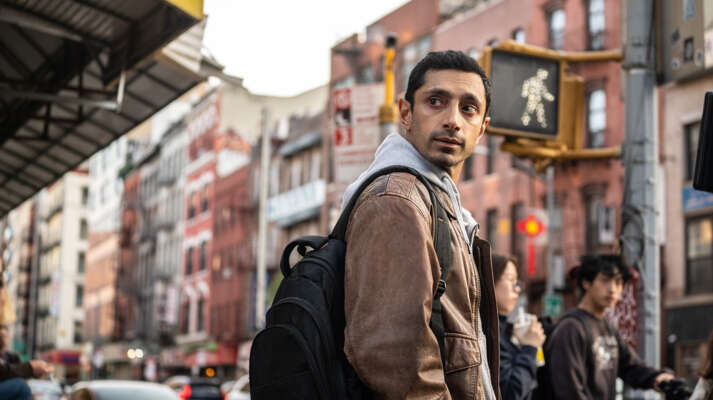Meet Ron Padgett
The Poet Behind Paterson
Meet Ron Padgett
Written by Peter Bowen
Above: Jim Jarmusch, Ron Padgett, and Adam Driver on the set of Paterson
In Jim Jarmusch’s PATERSON, Adam Driver plays Paterson, a bus driver and poet who lives in Paterson, New Jersey. His two vocations intersect when the world he witnesses from his driver’s seat inspires the verse he writes down later on. In the film, we not only observe his creative process but also get to hear and see the final product as his poems are graphically animated across the screen. Ron Padgett, the real poet behind the poems, however, remains invisible. A personal friend of Jarmusch, Padgett contributed seven poems to the film. Since the 1960s, Padgett has been a major figure in contemporary American poetry, publishing over 20 collections of poetry either by himself or in collaboration with others. He’s also penned several prose works and has translated from the French the works of Blaise Cendrars and Guillaume Apollinaire. Among his many honors are a Guggenheim Fellowship, a Civitella Ranieri Fellowship, the American Academy of Arts and Letters poetry award, the Shelley Memorial Award, the Robert Creeley Award, and grants from the National Endowment for the Arts. His 2011 book, How Long, was a Pulitzer Prize finalist in poetry and his Collected Poems won the Los Angeles Times Book Prize for the best poetry book of 2014 and the William Carlos Williams Award from the Poetry Society of America. In surveying his work, the poet James Tate exclaimed, “Ron Padgett’s poems sing with absolutely true pitch. And they are human friendly. Their search for truths, both small and large, can be cause for laughter, or at least a thoughtful sigh.” We spoke with Padgett about PATERSON, Paterson, and poetry.
How did you get involved with the film PATERSON?
Ron Padgett: A couple of years ago, Jim [Jarmusch] called me up and, in the course of the conversation, asked me if I would be willing to advise him on a film that would involve poetry. I think he also mentioned that it might take place in New Jersey. I said, “Sure thing. Anything you need.” Then a year or so later, he asked me, “Are you still interested? It is going to be a film about this bus driver in Paterson. And there are a lot of things about poetry in this film, and I want to be sure that we are getting it right. We’ll need you to advise and maybe suggest set dressing. Books to have on the guy’s shelf.” Then he causally added, “We might even use a few of your poems in the film.” I said, “Great. Go ahead.” When he called again, he zeroed in. “I have picked out some poems of yours I would like to use in the film,” he said. “Can I send you the titles and see if these are ok?” I said, “Great.” He was doing all the work; I was just being flattered. “This is just tentative,” he added. “I can’t promise we’ll use all of them.” I said, “Jim, do whatever you want.” And then he added, “If there are any other poems that come up that you might want to suggest––or you might even want to write something.” I said, “Well, Jim, I am not very good at writing on demand, but I’ll keep my mind open.” So we left it at that. After that conversation, my mind started mulling over the idea. And lo and behold, a couple days later, I found myself drifting in my head, as if I was a bus driver in Paterson. It had been many years since I have been there. I had visited the Falls in Paterson as a pilgrimage to William Carlos Williams’s home. Then I’d gone to Williams’s house and been invited inside by his widow. So I wasn’t completely unfamiliar with the territory. But I had never written a poem as if I was a bus driver before. In the course of the next four to five weeks, I wrote four poems. One was terrible—even I thought it was terrible–so I didn’t force that one on Jim. But I sent him the other three [“Another One,” “The Run,” and “The Line”]. He was very nice about it, telling me they were perfect. I told him, “Use them. Don’t use them. I had fun writing them.” In the end, he used a bunch of them, both existing poems and the ones that I wrote for the film.
What were the existing poems of yours that Jarmusch chose?
He picked four poems: “Love Poem,” “Glow,” “Pumpkin,” and “Poem.” My Collected Poems had recently been published, so Jim was able to browse through all my poems in that one book.
It is sort of poetic that your Collected Poems won the Poetry Society of America's 2014 William Carlos Williams Award since Williams’ poem Paterson influences Jarmusch’s film. When you wrote the original poems for the film, did you write them in the character of Paterson?

Once the writing is in process, there is not that much difference between the way I write as me or as I write as a bus driver, or any character. The thing is that when I am in character, I have to be careful not to fall out of character. I have to respect the psyche of the character I am taking on. It would be very strange if Paterson started off writing about matches, and then veers off to talk about the delicacies of brain surgery, an area in which you would not expect a bus driver or ex-marine to know much about. Whereas “I” myself, I can write about anything. As a poet, I give myself that license. But I can’t give that license to a character.
Paterson reads a lot of other poets. Did you work with Jarmusch to designate which poets Paterson keeps on his shelf?
No. That was all Jim’s doing. Jim is a very literate guy. He is especially literate about 20th and 21st century poetry. He has often been quoted as saying that some of his favorite poets of the 20th century are the New York School poets, like Frank O’Hara, John Ashbery, James Schuyler, and Kenneth Koch, with whom Jim actually studied at Columbia University.
You’ve known Jarmusch for quite a while. How did you two meet?
I learned of Jarmusch initially from my son, who told me many years ago that I should see this new film called Stranger than Paradise. My son had pretty good taste. I went to see the film and I was kind of knocked out by it. I started seeing all of Jim’s films after that. Then someone told me that Jarmusch went to Columbia (just like me) and studied with Kenneth Koch (just like me). “You probably have something in common,” my friend said. Some years later, Paul Auster invited me to dinner and told me, by the way I am going to invite Jim Jarmusch and Sara Driver. Is that ok? I said, “Great! I’ve always loved his movies.” Jim and I hit it off right away, although I was a little bit shy, since I thought of him as this famous director. I was trying not to say the wrong thing at dinner. When dinner was over, Jim suggested that we share a car back to Manhattan. It turned out Jim didn’t live too far from me. After we crossed the bridge from Brooklyn and were driving up Bowery, I leaned forward and said, “I promised myself that I wasn’t going to do this, but I am going to do it anyway. I just want to tell you I think your movies are great, and I really admire your work.” Jarmusch said, “God! I’ve been waiting all night to tell you that I’ve been a huge fan of your poetry for decades. I didn’t think it would be cool to tell you.” So that sealed the deal and after that we became good friends.
Paterson writes poems but is hesitant to call himself a poet. How did you become a poet?
First off, I should say that I don’t think of myself as a professional poet or professional anything. For many years, I was an editor and got paid money for it. I started writing when I was about 12 or 14. By the time I was 16, the only thing that I really wanted to do was write poetry. I had no vocational interest whatsoever. So I tried to build a life where I could just write poetry and not be crushed by the material world, or punished for that decision. Over time I got involved with other poets. I published in magazines and books and edited magazines and books. I gave readings and directed poetry programs. My books started getting reviewed and people started calling me a poet. Early on when I would meet someone at a party, and they would ask, “What do you do?” I would say, “I’m a writer.” I didn’t want to say “I’m a poet” because if you said that, it’s a real conversation killer. They would respond, “Oh yeah, my wife likes poetry” or “I think I read some poetry when I was in high school.” I wasn’t willing to say that I’m a poet, even though that is how people saw me. But I was. When I taught workshops around the country, people would sometimes shyly approach me and say, “I write poetry, but I’m not a poet.” I told them––and continue to tell people–– “If you write poetry, then you are a poet.” Paterson doesn’t want to admit he’s a poet; he just wants to write it. He is very shy and very modest.
Are there ways that you feel you are similar to Paterson?
It would seem that he has a working-class or middle-class background, and that is true of me as well. My parents managed to claw their way up to the bottom layer of the middle class. So we are similar in that way. Both Paterson and I are visually oriented people. We pay attention to what we are looking at. Just being aware of the smallest things around you, like a matchbook, will inspire you to write a poem.
How do you think you are different from Paterson?
I came to New York City to go to school and I pretty much stayed here. I was not isolated like him. I never had a 9-to-5 job in my life. Paterson seems to lack confidence in what he writes. I didn’t lack confidence when I was his age. I wasn’t sure that what I was writing was great, but I was sure that I wanted to do it. And that I was going to keep doing it and nothing was going to stop me.


